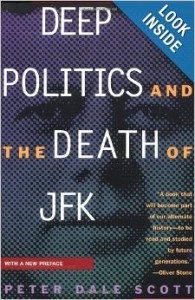By Herbert L Calhoun on November 16, 2006
Along with Carl Oglesby's The Yankee [and] Cowboy War and Michael Piper Collins' Final Judgment, this is the best book ever written on the JFK Assassination. It may also be the best book ever written on the way the American political process ACTUALLY works. It is certainly the most honest one.
Deep Politics should be required reading for undergraduates in all American college and university Political Science courses. If for no reason other than that, in the course of getting at the bottom of the assassination of JFK, Professor Scott did not hesitate to expand the context of American political life to those unacceptable areas that lay just beneath the American consciousness and at the bottom of the American political undercurrents.
Once one is guided through his process of expanding the context of understanding (or actually “over-understanding”) the machinations of the American Political process (its corruption, deceptions, cover-ups, and other pretexts for explaining away its immorality), then the details of the assassination itself, are almost a foregone conclusions – little more than a logical afterthought.
All three authors focus on what is most important — the big picture – leaving the details to be sorted out by those “eager beaver” researchers that seem so much to relish and are so obsessed with, the minutia such as “who was in the sixth floor window,” and with what happen to Senator's Specter's now infamous “Magic bullet,” etc. ad infinitum.
Oglesby eschews these nasty details and focuses on the economic war between the old money of the Northeast and the new money of the Southwest. In a reductionist socialist sort of way, he shows that the JFK assassination and Watergate were mere logical conclusions of this economic war. Collins, on the other hand, but like a radar (and like Jim Garrison before him), uses his own “crap detector” to separate the wheat from the shaft and divides the important from the inessential by forging ahead like a bulldog, even against charges of being anti-Semitic, to the only logical conclusion: that Myer Lansky was at the center of the planning of the JFK assassination. Scott, in his own inimical and professorial way, lays out a new political geography of the American political chessboard; one that is expanded to include what is both above and below the political waterline. He then shows that certain roles and circumstances when they cross the lines of morality, limit the men in them to only certain immoral squares on the chessboard.
It turns out that once the links connecting “organized crime” to “disorganized crime” (the criminal minds within the acknowledged and “so-called” legitimate American political process) there is little else that needs explanation. The moves on the American chessboard are all then pre-determined and predictable. It is checkmate for anyone who gets in their way as JFK did, and for the American people and the democratic process — which they all claim to love so much.
By showing that these unholy connections not only exist but are in symbiotic alliance with each other, and trump the normal American political process, Scott not only exposes, but lays completely bare the underbelly of the utter hypocrisy and corruption of the American political process.
There is one example in the book, above all others, that best summarizes and punctuates the orgy of corruption that existed in the American political process at the time of the JFK assassination and that remains alive as a result of it.
It is the Pre-assassination party (or final coordination meeting, or whatever one wants to call it) called to order in Dallas by J. Edgar Hoover at Clint Murchinson's house on November 21, 1963, the eve of the assassination.
The attendees included, among others:
J. Edgar Hoover (Head of the FBI, next door neighbor of LBJ, racist and Jew hater, and friend of mobster Frank Costello), Clint Murchinson (Texan oil Baron, racist and Jew hater but still a business partner of Myer Lansky, and acknowledged Kennedy hater),
H.L. Hunt (financier of rabid right-wing fanatic causes, racist and Jew hater, Texas Oil Baron, and Kennedy Hater), John J. McCloy (Washington Lobbyist/Fixer and later to be appointed member of the Warren Commission investigating the JFK assassination), Allen Dulles (ex-head of the CIA, fired by JFK in the aftermath of the Bay of Pigs fiasco, and soon to be appointee to the Warren Commission investigating the assassination of JFK), John Connally (ex-Secretary of the Navy, ex-Governor of Texas and close friend and confidant of LBJ), General Charles Cabell (Deputy Director of the CIA fired by JFK after the Bay of Pigs fiasco), and his brother Earle Cabell (the Mayor of Dallas at the time of the assassination), Richard Nixon (defeated by JFK for the U.S. Presidency, and avowed Kennedy hater), LBJ (the sitting Vice President who was days away from going to jail because of a whole series of scandals, and who would be sworn-in on Air Force One minutes after the assassination as JFK's successor)
Would someone please give me an innocent explanation for such a meeting in Dallas of all of these Kennedy haters on the eve before his assassination?
Phi Beta Iota: Daniel P. Sheehan uses this book to conclude his 2013 university course covering seven theories of who killed JFK. See his online references and videos: Daniel P. Sheehan: Who Killed JFK?.
See Also:
Review: JFK and the Unspeakable–Why He Died & Why It Matters
Review: JFK: The CIA, Vietnam, and the Plot to Assassinate John F. Kennedy
Review: Legacy of Secrecy–The Long Shadow of the JFK Assassination
Review: Tears of Autumn–A Paul Christopher Novel




